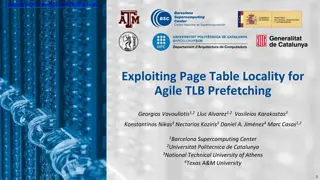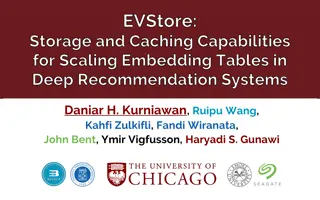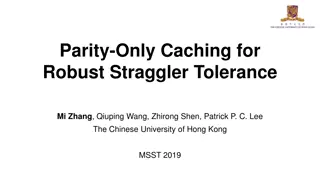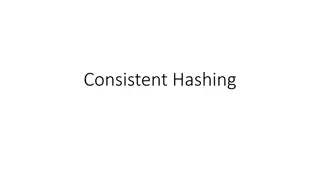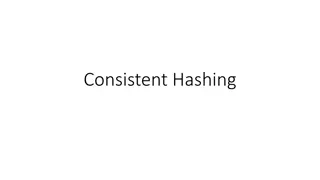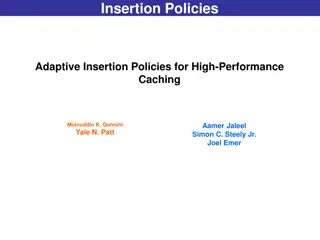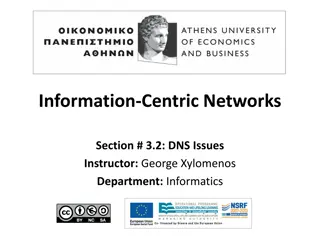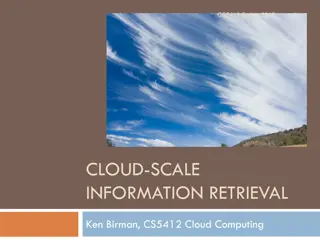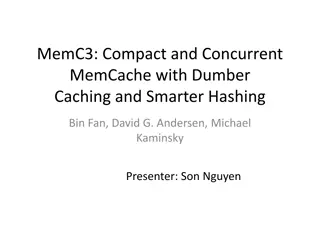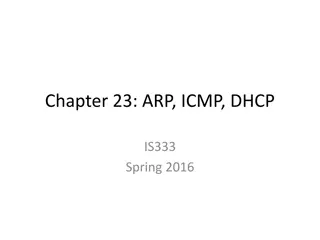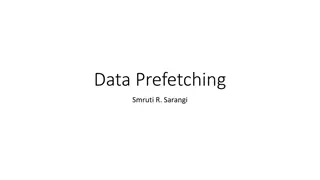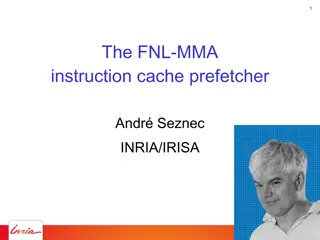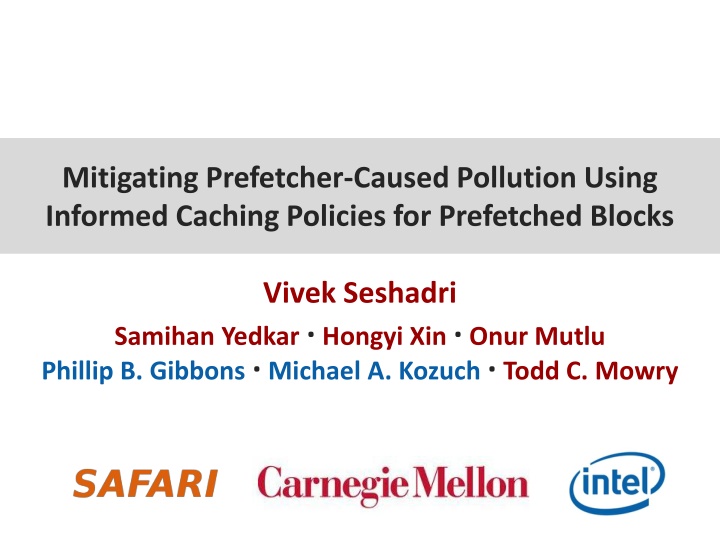
Mitigating Prefetcher-Caused Pollution Using Informed Caching Policies
This research focuses on addressing cache pollution caused by prefetching mechanisms through informed caching policies. By accurately demoting or predicting the accuracy of prefetched blocks, the study shows significant performance improvements. The proposed Informed Caching Policies aim to reduce cache pollution and enhance cache efficiency for various workloads.
Download Presentation

Please find below an Image/Link to download the presentation.
The content on the website is provided AS IS for your information and personal use only. It may not be sold, licensed, or shared on other websites without obtaining consent from the author. If you encounter any issues during the download, it is possible that the publisher has removed the file from their server.
You are allowed to download the files provided on this website for personal or commercial use, subject to the condition that they are used lawfully. All files are the property of their respective owners.
The content on the website is provided AS IS for your information and personal use only. It may not be sold, licensed, or shared on other websites without obtaining consent from the author.
E N D
Presentation Transcript
Mitigating Prefetcher-Caused Pollution Using Informed Caching Policies for Prefetched Blocks Vivek Seshadri Samihan Yedkar Hongyi Xin Onur Mutlu Phillip B. Gibbons Michael A. Kozuch Todd C. Mowry
Summary Existing caching policies for prefetched blocks result in cache pollution 1) Accurate Prefetches (ICP Demotion) 95% of useful prefetched blocks are used only once! Track prefetched blocks in the cache Demote prefetched block on cache hit 2) Inaccurate Prefetches (ICP Accuracy Prediction) Existing accuracy prediction mechanisms get stuck in positive feedback Self-tuning Accuracy Predictor ICP (combines both mechanisms) Significantly reduces prefetch pollution 6% performance improvement over 157 2-core workloads 2 Informed Caching Policies for Prefetched Blocks
Caching Policies for Prefetched Blocks Problem: Existing caching policies for prefetched blocks result in significant cache pollution Cache Miss: Insertion Policy Cache Hit: Promotion Policy MRU LRU Cache Set 3 Informed Caching Policies for Prefetched Blocks
Prefetch Usage Experiment Monitor L2 misses Prefetch into L3 Off-Chip Memory L 1 CPU L2 L3 Prefetcher Classify prefetched blocks into three categories 1. Blocks that are unused 2. Blocks that are used exactly once before evicted from cache 3. Blocks that are used more than once before evicted from cache 4 Informed Caching Policies for Prefetched Blocks
Usage Distribution of Prefetched Blocks 100% Fraction of Prefetched Blocks 90% 80% 70% 60% 50% 40% 30% 20% 10% 0% Used > Once Used Once Unused 5 Informed Caching Policies for Prefetched Blocks
Outline Introduction ICP Mechanism ICP promotion policy ICP insertion policy Prior Works Evaluation Conclusion 6 Informed Caching Policies for Prefetched Blocks
Shortcoming of Traditional Promotion Policy Promote to MRU Cache Hit! MRU LRU D D D P P P D P D Cache Set 7 Informed Caching Policies for Prefetched Blocks
ICP Demotion Demote to LRU Cache Hit! MRU LRU D D D P P P D P D Cache Set 8 Informed Caching Policies for Prefetched Blocks
Outline Introduction ICP Mechanism ICP promotion policy ICP insertion policy Prior Works Evaluation Conclusion 9 Informed Caching Policies for Prefetched Blocks
Cache Insertion Policy for Prefetched Blocks Good (Accurate prefetch) Bad (Inaccurate prefetch) Good (Inaccurate prefetch) Bad (accurate prefetch) Prefetch Miss: Insertion Policy? MRU LRU Cache Set 10 Informed Caching Policies for Prefetched Blocks
Predicting Usefulness of Prefetch Fraction of Useful Prefetches Prefetch Miss Predict Usefulness of Prefetch Accurate Inaccurate MRU LRU Cache Set 11 Informed Caching Policies for Prefetched Blocks
Shortcoming of Fraction of Useful Prefetches b b b b b b Threshold Prefetch Miss Accurate Inaccurate MRU LRU Cache Set 12 Informed Caching Policies for Prefetched Blocks
ICP Accuracy Prediction Recently-evicted Predicted-inaccurate Prefetched Blocks P MRU LRU Miss Evicted Prefetch Filter Demand Request Hit Accurate prefetch mispredicted as inaccurate 13 Informed Caching Policies for Prefetched Blocks
ICP Summary ICP Demotion (ICP-D) Track prefetched blocks in the cache Demote prefetched block to LRU on cache hit ICP Accuracy Prediction (ICP-AP) Maintain accuracy counter for each prefetcher entry Evicted Prefetch Filter (EPF): tracks recently-evicted predicted-inaccurate prefetches Bump up accuracy counter on cache miss + EPF hit Hardware Cost: only 12KB for a 1MB cache 14 Informed Caching Policies for Prefetched Blocks
Outline Introduction ICP Mechanism ICP promotion policy ICP insertion policy Prior Works Evaluation Conclusion 15 Informed Caching Policies for Prefetched Blocks
Prior Works Feedback Directed Prefetching (FDP) (Srinath+ HPCA-07) Use pollution filter to determine degree of prefetch pollution Insert all prefetches at LRU if pollution is high Can insert accurate prefetches at LRU Prefetch-Aware Cache Management (PACMan) (Wu+ MICRO-11) Insert prefetches both into L2 and L3 Accesses to L3 filtered by L2 (directly insert at LRU in L3) Does not mitigate pollution at L2! 16 Informed Caching Policies for Prefetched Blocks
Outline Introduction ICP Mechanism ICP promotion policy ICP insertion policy Prior Works Evaluation Conclusion 17 Informed Caching Policies for Prefetched Blocks
Methodology Simulator (released publicly) http://www.ece.cmu.edu/~safari/tools/memsim.tar.gz 1-8 cores, 4Ghz, In-order/Out-of-order 32KB private L1 cache, 256KB private L2 cache Aggressive stream prefetcher (16-entries/core) Shared L3 cache (1MB/core) DDR3 DRAM Memory Workloads SPEC CPU2006, TPCC, TPCH, Apache 157 2-core, 20 4-core, and 20 8-core workloads Metrics Prefetch lifetime (measure of prefetch pollution) IPC, Weighted Speedup, Harmonic Speedup, Maximum Slowdown 18 Informed Caching Policies for Prefetched Blocks
Single Core Prefetch Lifetime Baseline PACMan ICP-D ICP-AP ICP Performance Improvement of ICP over Baseline Prefetch Lifetime (Number of misses) 18 0% 7% 24% 3% 16 14 12 10 8 6 4 2 0 libquantum omnetpp art gmean 19 Informed Caching Policies for Prefetched Blocks
2-Core Performance PACMan ICP-D ICP-AP ICP 10% Weighted Speedup Improvement 9% 8% 7% 6% 5% No Inaccurate & Accurate 4% Accurate Inaccurate Pollution 3% 2% 1% 0% Type-1 Type-2 Type-3 Type-4 Type-5 All 20 Informed Caching Policies for Prefetched Blocks
Other Results in the Paper Sensitivity to cache size and memory latency Sensitivity to number of cores Sensitivity to cache replacement policy (LRU, DRRIP) Performance with out-of-order cores Benefits with stride prefetching Comparison to other prefetcher configurations 21 Informed Caching Policies for Prefetched Blocks
Conclusion Existing caching policies for prefetched blocks result in cache pollution 1) Accurate Prefetches (ICP Demotion) 95% of useful prefetched blocks are used only once! Track prefetched blocks in the cache Demote prefetched block on cache hit 2) Inaccurate Prefetches (ICP Accuracy Prediction) Existing accuracy prediction mechanisms get stuck in positive feedback Self-tuning Accuracy Predictor ICP (combines both mechanisms) Significantly reduces prefetch pollution 6% performance improvement over 157 2-core workloads 22 Informed Caching Policies for Prefetched Blocks
Mitigating Prefetcher-Caused Pollution Using Informed Caching Policies for Prefetched Blocks Vivek Seshadri Samihan Yedkar Hongyi Xin Onur Mutlu Phillip B. Gibbons Michael A. Kozuch Todd C. Mowry

